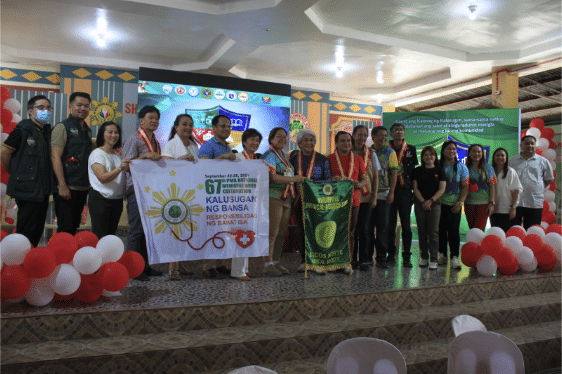Ilocos Norte launches school-based vaccination for young girls against cervical cancer
The province of Ilocos Norte has intensified its efforts to safeguard young girls against cervical cancer by becoming the first province in the country to launch a school-based immunization program.

Mayor Michael Marcos Keon, delivering the welcoming remarks during the Laoag School-Based Immunization Launch of Bakuna Eskwela
The initiative, dubbed “Bakuna Eskwela,” is a joint effort between the Department of Health (DOH) and the Department of Education (DepEd). It aims to immunize 15,000 Grade 4 female students across Region 1, aligning with the World Health Organization’s (WHO) global strategy to eliminate cervical cancer. The school-based campaign follows the success of Banna, a town in Ilocos Norte, which reached a 90% HPV vaccination rate in March 2024.
At the launch, the province hopes to vaccinate over 1,000 girls aged 9-14 against the human papillomavirus (HPV), a leading cause of cervical cancer. Additionally, some students will receive vaccines against measles, rubella, tetanus, and diphtheria.
Rising Cases Highlight Urgency for Immunization

Ilocos Norte, Vice Governor, Cecilia Araneta Marcos (3rd from the right), with the kids during HPV vaccination
HPV is the leading cause of cervical cancer, which ranks as the second most frequent cancer among Filipino women, with around 12 women dying daily from the disease. It particularly affects those between the ages of 15 and 44. With an estimated 37.8 million women at risk of the disease, early prevention remains essential to reduce mortality rates. However, the disease is preventable through primary prevention, such as HPV vaccination, and secondary measures like regular screening.
In Ilocos Norte, the youngest patient battling cervical cancer is a 30-year-old woman currently receiving treatment at Mariano Marcos Memorial Hospital and Medical Center in Batac City.
Provincial Health Officer Dr. Rickson Balalio expressed concern that women are being diagnosed with cervical cancer at younger ages. “When cervical cancer is detected, it is often already in an advanced stage, making treatment less effective,” Balalio warned.
With this, the medical expert hopes that more local government units will replicate this health initiative to ensure that all Filipinos have access to vaccinations and eliminate cervical cancer at once.
“I could say that this activity is excellent and beneficial to our constituents. This showcases that in our province, vaccine hesitancy among parents regarding vaccinating their children has been eliminated. Hopefully, neighboring provinces will follow our example.” said Balalio.
Provincial and Regional Commitment to Eliminate Cervical Cancer

Photo shows Hon. Medeldorf Gaoat, MD, Board Member- Committee on Health Lead, Ilocos Norte (7th from the right), Dra Rosario Pamintuan, Officer in Charge, Local Health Support Division (8th from the right), Rickson R. Balalio MD, Provincial Health Officer, Ilocos Norte (9th from the right), Ilocos Norte, Vice Governor, Cecilia Araneta Marcos (center) during the commitment exercise for S.H.I.E.L.D. Against Cervical Cancer Program
John Paul Aquino, regional immunization coordinator of DOH Region 1, emphasized the need for local governments to support these efforts. “Our government has only purchased 750,000 doses for this year, which is roughly 30 percent of our target. That’s why it’s crucial to have our local chief executives involved, as they can help augment and provide support in the effort to eliminate cervical cancer.”
Vice Governor Cecilia Araneta-Marcos lauded the school-based vaccination program, highlighting its significance in protecting the province’s youth. “This vaccine has been available and tested for 12 years. We should give our children a better chance because this vaccine will help prevent cervical cancer in their future,” she said.
The vice governor announced that discussions have taken place with Dr. Medeldorf Gaoat, chair of the health committee in Ilocos Norte, and lawyer Pancho Jose, Governor Matthew Marcos Manotoc’s chief of staff, to strengthen the provincial government’s commitment to improving health access for Ilokanos, particularly in expanding vaccination efforts.
In response, Gaoat said the provincial board has recently passed a resolution committing to the 100 percent vaccination rate in Ilocos Norte, replicating Banna town’s achievement on this program.
“That’s why the province of Ilocos Norte is aiming to achieve the number one spot in the entire Philippines for our vaccination rate. We are committed to this goal. We are also in discussions on how to procure this type of vaccine, as we understand it can be expensive. This is one of the challenges that hinders people from getting vaccinated. However, with the commitment of the provincial government, we are hopeful that we can secure vaccines through the DOH and MSD, making them more affordable for everyone,” said Gaoat.
Laoag City Mayor Michael Marcos Keon also expressed his full support for the Bakuna Eskwela program, underscoring the importance of healthcare initiatives for his constituents. “Ensuring the overall well-being of Laoag’s residents is a top priority, and I am proud to host this significant event,” he said.
The school-based immunization program will continue throughout October, with the goal of protecting as many girls as possible from HPV and cervical cancer.
ADVT.
This article is brought to you by Cervical Cancer Patients.